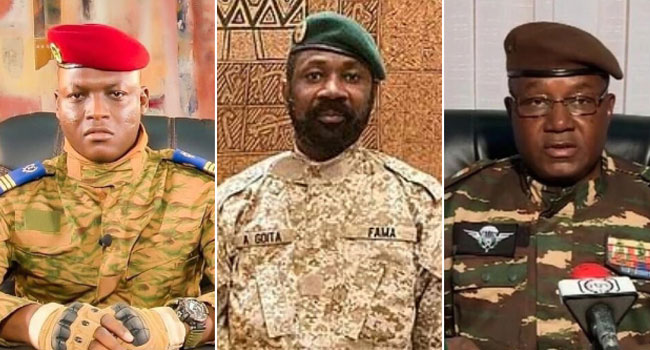The military administrations of Burkina Faso, Mali, and Niger declared on Sunday, their prompt departure from the West African bloc ECOWAS, asserting that it now poses a threat to the well-being of its member states.
The leaders of the three Sahel nations have asserted in a statement that their decision to withdraw from the Economic Community of West African States (ECOWAS) is a “sovereign choice” to be executed promptly.
These nations, grappling with jihadist violence and poverty, have experienced strained relations with ECOWAS following coups in Niger in July of last year, Burkina Faso in 2022, and Mali in 2020.
Despite being founding members of ECOWAS in 1975, all three nations were suspended from the organization.
Niger and Mali faced substantial sanctions as ECOWAS aimed to expedite the restoration of civilian governments through elections.
The leaders of these nations deem the sanctions as an “irrational and unacceptable stance,” particularly at a time when they assert their determination to seize control of their destinies, alluding to the coups that ousted civilian administrations.
In recent months, the three nations have solidified their positions and united under an “Alliance of Sahel States.”
The collective statement from the leaders further emphasized that the 15-member ECOWAS, swayed by foreign influences and deviating from its foundational principles, has evolved into a menace for member states and their populations.
They accused the alliance of falling short in aiding them against the jihadist threats that originated in Mali in 2012 and subsequently extended into Burkina Faso and Niger.
However, opting out of ECOWAS could pose challenges for the three land-locked nations, potentially impeding trade, elevating the cost of goods, and potentially reintroducing visa requirements for travel.
Under pressure from the military administrations, France, the former colonial power, has withdrawn ambassadors and troops, allowing Russia to step in both militarily and politically.
The withdrawal of the French army from the Sahel region, spanning across the Sahara desert in Africa, has raised concerns about the potential spread of conflicts southward to Gulf of Guinea states such as Ghana, Togo, Benin, and Ivory Coast.
– ‘Bad faith’ –
On Thursday, the prime minister appointed by Niger’s regime criticized ECOWAS for what he deemed as “bad faith,” as the regional bloc largely avoided a scheduled meeting in Niamey.
Niger had anticipated a chance to discuss its differences with other ECOWAS member states, but the bloc had distanced itself from Niamey, imposing significant economic and financial sanctions in response to the military coup that ousted the elected president, Mohamed Bazoum.
The military leaders in Niger are grappling with soaring food prices and a shortage of medicines, expressing their desire for a transition back to civilian rule within a timeframe of up to three years.
Meanwhile, in Mali, the ruling officers led by Colonel Assimi Goita initially committed to holding elections in February of this year, but the schedule has been postponed to an unspecified date.
In Burkina Faso, despite Captain Ibrahim Traore seizing power in September 2022, the country has not faced sanctions. The authorities in Burkina Faso have scheduled elections for this summer, emphasizing that the ongoing fight against insurgents takes precedence.



